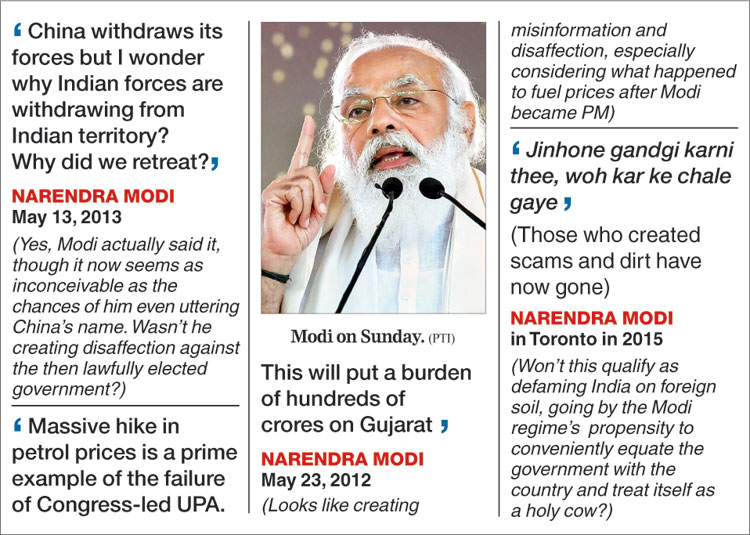An arrest warrant has been issued against a young lawyer. An engineer is also facing arrest. Their whereabouts are not known. Disha Ravi, a young climate activist, is already in police custody in what is being referred to as the “toolkit” case.
Amid a litany of charges that have been described by sections of civil society as “absurd”, one levelled by Delhi police against the youths stood out: “The main aim of the toolkit was to create misinformation and disaffection against the lawfully enacted government.”
The police added that the toolkit sought to amplify fake news and other falsehoods and precipitate “physical action” on Republic Day.
Such vague charges can be levelled against almost all groups, not just critics of the government but even supporters who on Monday were using their own toolkit with identical sentences to condemn Disha and other activists.
Delhi police’s explanation came as they named two more accused in the “toolkit” sedition case.
The police said they had obtained non-bailable arrest warrants against Nikita Jacob, a Bombay High Court lawyer, and Shantanu, a Maharashtra-based engineer, but found they were not at their homes.
The police did not mention Shantanu’s surname but some TV channels said it was Muluk.
Officers claimed Nikita and Shantanu had prepared the social media toolkit along with Disha, a 21-year-old climate activist arrested by Delhi police from Bangalore on Saturday.
The toolkit is a Google document that police say was part of a Khalistani conspiracy to wage war against India by, among other things, instigating violence during the farmers’ Republic Day tractor rally.
“A woman named Puneet, based in Canada, connected these people to the pro-Khalistan Poetic Justice Foundation and through them created toolkit Google documents titled ‘Global Farmer Strike’ and ‘Global Day of Action, 26 January’,” Joint commissioner of police (cyber cell) Prem Nath said.
He said Nikita had been the first suspect and had named the two others during questioning earlier this month.
Nath said Delhi police had on February 4 come across the toolkit on Twitter, and their investigations suggested the Poetic Justice Foundation and people associated with it had created it.
The Canada-based, 11-month-old foundation, whose founder has been accused of making a pro-Khalistan statement, says it “challenges structures of oppression and discrimination through intersectional grassroots advocacy”.
In any case, even membership of a banned organisation is not an offence in India unless accompanied by violence or incitement to a crime, according to a Supreme Court ruling in 2011. The Centre had sought a review of this ruling in 2016.

Nath said the toolkit mentioned, under the head “Prior Action”, programmes such as a “digital strike” through hashtags on January 26 and earlier; a “tweet storm” from January 23 onwards; “physical action” on January 26; and entry into Delhi for the Kisan Parade before returning to the capital’s border.
These are standard phrases that youngsters use online to organise protests. “Physical action” need not mean violence and it could signify any democratic form of protest such as a rally or a picket.
“The second part of the same document mentions tasks such as disruption of India’s cultural heritage such as ‘yoga’ and ‘tea’ and targeting Indian embassies abroad in various capitals,” Nath said.
“Disha, who is associated with the environmental movement called Fridays For Future, sent the toolkit document to Greta Thunberg on Telegram and coaxed her to act on it.”
Thunberg, a teenaged Swedish climate activist and global celebrity who had launched Fridays For Future in 2018, tweeted the toolkit on February 3, drawing wide attention to it.
“Based on the incriminating evidence collected from Disha’s device and in view of the fact that she had deleted her WhatsApp group, she was arrested,” Nath said.
Nath said Nikita and Shantanu had on January 11 “attended a Zoom meeting organised by the Poetic Justice Foundation where the modalities of the (agitating farmers’ and their supporters’) Global Day of Action were worked out”.
“Based on the course of action decided at the Zoom meeting, Nikita, Shantanu, Disha and others collaborated to draft the toolkit. The document they drafted had secessionist and pro-Khalistani content embedded into it through links and texts,” Nath alleged.
Prime Minister Narendra Modi had, in an apparent allusion to the toolkit, recently told an event in tea-growing Assam that there was a conspiracy to defame Indian tea.
Nath said: “The time-bound action points and programme given in this toolkit, when viewed in the context of the actual developments in Delhi, clearly showed that the action plan that was formulated in the toolkit document was executed in exactly the same manner.”











